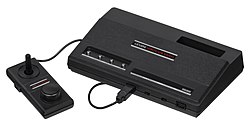Coleco Gemini
This article needs additional citations for verification. (March 2009) |
 The Coleco Gemini | |
| Manufacturer | Coleco |
|---|---|
| Type | Video game console |
| Generation | Second generation |
| Media | ROM cartridge |
| CPU | MOS 6507 @ 1.19 MHz |
| Memory | RAM: 128 bytes |
| Display | 160x200, 128 Colors [1] |
| Controller input | Combination joystick/paddle controller |
| Related | Atari 2600 |
The Coleco Gemini was an Atari 2600 clone manufactured by Coleco.
Technical specifications
History
In 1982, Coleco released Expansion Module #1 for its ColecoVision video game system using off-the-shelf components, that enabled the ColecoVision to be compatible with the Atari 2600. Atari, Inc. sued Coleco for patent infringement, and the companies wound up settling out of court with Coleco becoming a licensee of Atari's patents. [2]
Gemini vs. 2600
The main difference between the Coleco Gemini and the Atari 2600 is the controller design. The Coleco Gemini controllers featured an 8-way joystick and a 270-degree paddle on the same controller (the joystick was at the top of the controller, and the paddle was at the bottom of the controller). To play paddle games, a Y-connector was used to connect two controllers to the controller jack at the same time.
The Gemini was much more compact than the large faux-woodgrain consoles sold by Atari at the time. The Gemini also had a different game included with the system. Atari was still including the Combat game released in 1977. The Gemini most commonly included Donkey Kong, but at some point also included Carnival, Mouse Trap and Front Line. Sears also offered a version of the Gemini with both Donkey Kong and Mouse Trap included as separate cartridges.
Coleco struck a deal with Columbia House to start a video game club similar to its record club. Columbia sold the Coleco Gemini as the Columbia Home Arcade through the Columbia House Video Game Club. In Canada, CBS Electronics sold the Gemini under the Columbia Home Arcade name.
References
External links
- vidgame.net (archived version of page)
- Video review and tour of the console
